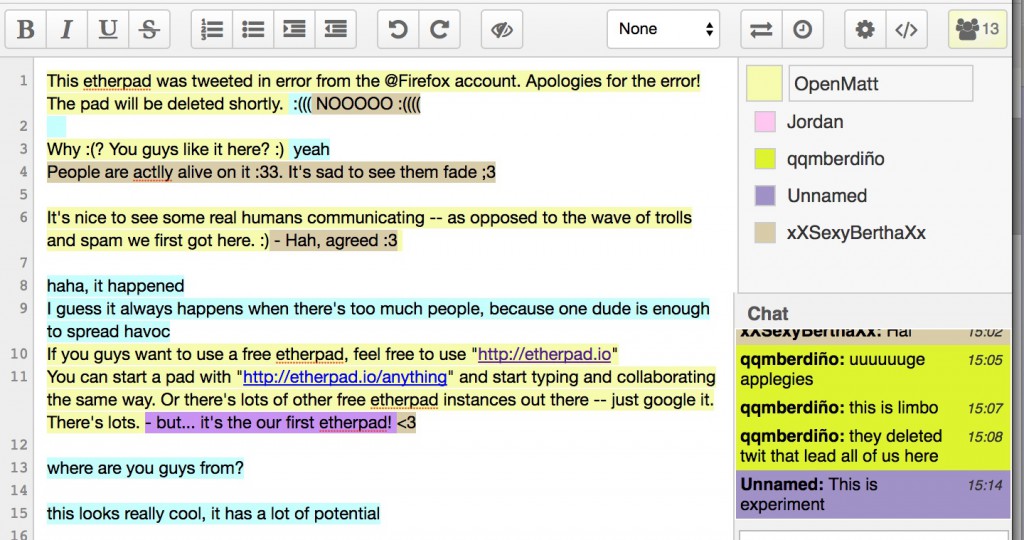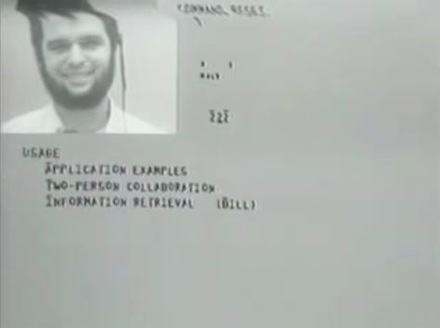A few days ago I did one of the dumbest things I’ve ever done at work: I accidentally sent a personal tweet through an official work account followed by 2.8 million people. :/
I was at the Mozilla Festival, prepping notes in an etherpad for a session I was helping to organize. I was distracted, signed in with the wrong credentials, hit the wrong button and — what?! ohmygod ohmygod ohmygod — suddenly realized I had just shared my geeky etherpad link with a potential audience of nearly 3 million (yes, million) twitter account followers.

Yep.
I knew something was up when a lot of people immediately showed up in that pad. Like… a lot. 20, 30, 50 folks streaming in all at once. “Strange game!” someone wrote. “What is this?!!!” Most had never seen an etherpad before (if you’re not familiar, it’s a simple collaborative writing and editing tool, like Google Docs). It’s basically just a blank sheet of paper posted on the web, one that anyone can read and write on — and the twitter users who had suddenly arrived there were (understandably) confused.
“What is this????”
“о чем это???”
“Make America Great Again!!!!!”
The pad was overflowing with random ether-noise and flotsam, with people all writing and remixing and talking over top of each other. I explained at the top of the pad that the link had been tweeted in error, and apologized for the mistake — but of course…. it’s an etherpad! People erased my message and just wrote over top of it. It filled with a cacophonous rainbow-colored torrent of ether-junk, a bubbling petrie dish of speech that pulsed and warbled and mutated all over itself.
It could have been worse — there are worse things to share out than a blank etherpad. But I was, of course, freaking out. As Mozilla staff, we take pains to ensure all our users (including twitter followers) have great experiences. So: I hit the red alert button. I sent panicky notifications to colleagues, found someone with the power to delete the tweet (something I lacked the credentials to do myself), and within about 20 minutes of my mistake, it had been erased, ensuring it wouldn’t confuse any more followers — a relatively small number of whom had actually seen the tweet.
My pulse slowly returned to a saner level.
BUT: there was still one issue remaining —
what to do about that etherpad?
No one new was arriving, but there were still a dozen or so users splashing around in it — with various weird memes, random You Tube videos, Cyrillic script and U.S. election slogans swirling. It was strange and unpredictable in there. I wanted to ensure none of those users ended up having a negative experience, so I filed a bug with I.T. to get the pad deleted.

But then, a funny thing happened: the trolls got bored and drifted away. The maelstrom of people shouting over top of each other quietened. Soon there were just a tiny handful of people left, and they started to… well… actually talk to each other.
“This looks really cool, it has a lot of potential,” one of the users wrote.
They’d never seen an etherpad before, and were intrigued by its open, geeky charm. A couple others started chatting about a problem they were having with their computer, offering each other advice. They were connecting. And helping each other.
“But… it’s our first etherpad! <3”
When I explained that the pad was going to be deleted soon, they were sad and didn’t want to leave.
NOOOOOOO!!!! :((((
— Why? Do you guys like it here?
Yeah. People are actually alive on it :3. It’s sad to see them fade.
This lead to me explaining they were welcome to start their own pad and keep talking, or use it whenever they wanted. Which they did.
#fail –> teachable moment
Thinking about it afterward, it felt fitting that the whole thing happened at the Mozilla Festival, a gathering of people dedicated to protecting and growing the human potential of the Internet — with a big emphasis on web literacy and open collaboration. My dumb fail had prompted a teachable web literacy moment all its own. These folks had encountered a new tool, experienced a brief moment of connection, and come away with a slightly different understanding of what you can do on the web. And the whole experience felt like it contained many of the core ingredients of the internet itself in 2016:
- noise / random weirdness / people talking over top of each other
- trolls
- dank memes
- русский
- Trump slogans
And, occasionally, when we’re lucky:
- learning
- new tools and possibility
- fortuitous accidents / serendipitous encounter
- brief moments of real human connection

“You mean, I can just type on this thing?!”
For me, as old school and antiquated as etherpad can now seem, it still contains a bit of web magic — and it was nice to see others discover some of that for the first time. Etherpad feels like a throwback to Doug Engelbart‘s original vision of what digital spaces are for: collaboration. He imagined interfaces that had two mouse pointers, not just one — because the whole goal was “people working together in a shared intellectual space.”
In a world of increasingly managed, read-only experiences, the fact that etherpads are so wide open to anyone to just write and edit on is a beautiful encapsulation of fragile trust and care, and of the multi-vocal nature of the web (and world) itself — what my lit professor would call “polyglossia,” multiple voices sharing a space.
My #MozFest 2016 moment
It’s not something I plan on doing again any time soon. (Or ever, ever again. Promise.) But I came away a little grateful for the accident. It felt like a very #MozFest moment.
“Jordan,” “qqmberdino” and “Bertha,” whoever, wherever you are — I hope you’re awesome, and still happily etherpadding in some corner of the web somewhere.
This is so great!
that is ‘freakin awesome…..